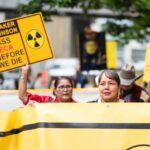Fukushima Future Studies: five years later, what have we learned?
By Dan Drollette Jr | March 3, 2016

The aftermath of the failure of two reactors in the spring of 2011 at Fukushima, Japan, involves more than background radiation or cleanup. In addition to deciding “safe” levels of radioactivity, regional authorities must also deal with the needs of those who were forcibly evacuated – and whether, five years later, the evacuees even want to return to their old homes. To overcome these and other problems, Fukushima University set up its “Fukushima Future Studies” program, which aims to learn about the long-term effects of a nuclear power plant accident, with an emphasis on hands-on, practical matters. In this interview, William McMichael, an assistant professor who runs part of the core curriculum of Fukushima Future Studies, talks with Bulletin Associate Editor Dan Drollette Jr.
Together, we make the world safer.
The Bulletin elevates expert voices above the noise. But as an independent nonprofit organization, our operations depend on the support of readers like you. Help us continue to deliver quality journalism that holds leaders accountable. Your support of our work at any level is important. In return, we promise our coverage will be understandable, influential, vigilant, solution-oriented, and fair-minded. Together we can make a difference.















